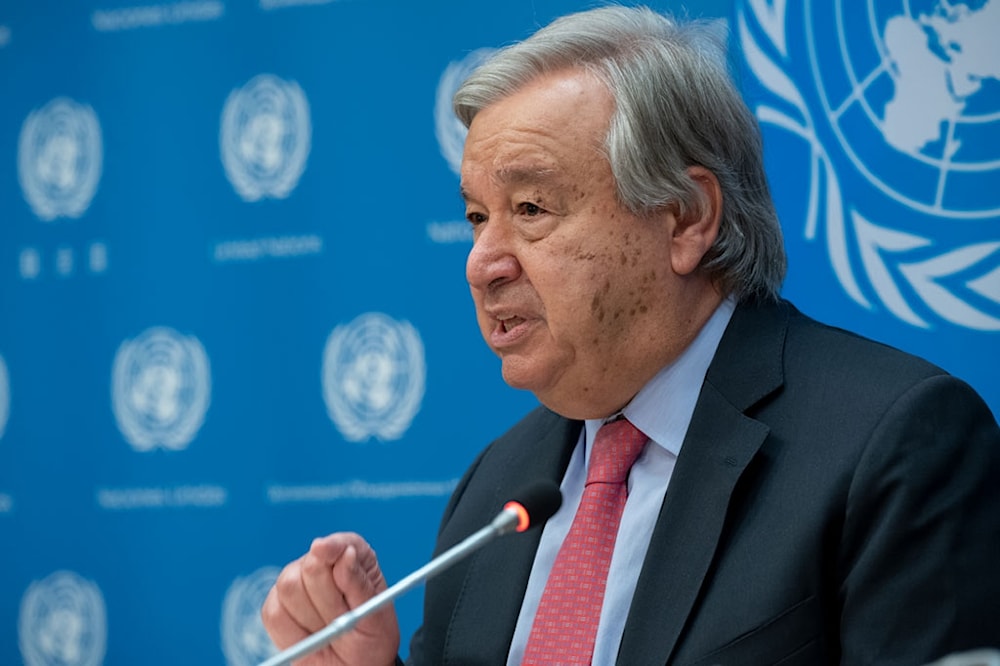'Israel's' rejection of 'two-state solution' 'unacceptable': UN chief
The persistent refusal of "Israel" to acknowledge the right to statehood for the Palestinian people poses a significant threat to global peace and security, UN Secretary-General says.
-

UN Secretary-General Antonio Guterres speaking at a press conference on the 77th session of the UN General Assembly in 2022. (United Nations)
UN Secretary-General Antonio Guterres has deemed "Israel's" “clear and repeated rejection of the two-state solution” unacceptable. He expressed concerns that such a stance could extend the war. Guterres made these remarks during a tense Security Council debate centered on aid shipments to Gaza.
“Last week’s clear and repeated rejection of the two-state solution at the highest levels of the Israeli government is unacceptable,” Guterres told the council.
“This refusal, and the denial of the right to statehood to the Palestinian people, would indefinitely prolong a conflict that has become a major threat to global peace and security,” he said.
Furthermore, he emphasized that the sole resolution to break free from the unending cycle of fear, hatred, and violence is through a "two-state solution".
Unjustifiable collective punishment: The plight of Gaza's people
Guterres said, “The entire population of Gaza is being subjected to destruction on a scale and speed unprecedented in history. Nothing can justify the collective punishment of the people of Gaza.”
“More than half a million people face hunger in Gaza. 2.2 million people are living in inhumane squalid conditions struggling to make it through another day," he added.
Guterres stated that with hospitals collapsing, the spread of diseases poses a severe threat to Palestinians in the besieged territory. He cautioned that they face risks not only from bombardments but also from cholera, dysentery, and hepatitis.
“No effective humanitarian aid operation can function under the conditions that have been forced on Palestinians in Gaza and those doing everything possible to help them,” he asserted.
Guterres conveyed that 6,000 Palestinians had been detained, expressing deep concern over reports of inhumane treatment of Palestinians in Israeli detention.
He urged an urgent ceasefire to enable the delivery of essential aid, facilitate the release of captives, and alleviate tensions across the Middle East. Guterres cautioned that the increasing risk of broader regional escalation was becoming a tangible reality.
'Stop this massacre'
Riyad Mansour, the Palestinian ambassador to the UN, noted that from the G77 meeting in Kampala to the EU foreign ministers in Brussels and the UN in New York, there was a global demand for an urgent humanitarian ceasefire. He accused Netanyahu of being solely motivated by his own survival, emphasizing a clear divide between those advocating for peace and those obstructing it. Numerous speakers, particularly from the Middle East, echoed the call for an immediate humanitarian ceasefire and a swift transition toward a "two-state solution".
Jordan's Foreign Minister, Ayman Safadi, urged an end to the ongoing Israeli massacre in Gaza, emphasizing the imperative need for a binding Security Council resolution to compel the cessation of Gaza's suffering. He asserted that only comprehensive resolutions, not partial measures, can bring about lasting peace.
“All of you support the two-state solution that the Israeli government is undermining,” he said.
He emphasized that the political aspirations and extremist agendas of Israeli radicals should not hold the future of the region hostage.
Lebanese Foreign Minister Abdallah Bou Habib cautioned nations against becoming ensnared in an Israeli strategy to expand the war to Lebanon.
“Have not we learned anything from our past mistakes; is it not high time we acknowledge that we cannot cancel each other out?,” he said.
The United Arab Emirates envoy, Lana Zaki Nusseibeh, said, “We will not support a return to the failed status quo. Before, the two-state solution was the end point to where we envisioned our diplomatic efforts would lead. Now it must be our starting point.”
On his account, Saudi Arabia's Minister of Foreign Affairs, Waleed El-Khereiji, denounced "Israel’s" war machine.
The Iranian Foreign Minister, Hossein Amir Abdollahian, said, “Instead of calling on others to exercise restraint, the US must compel the Israeli regime to stop the war and pull itself out of the trap that the Israeli regime has set to drag the US into direct conflict.”
“Security cannot be achieved by resorting to the use of force and committing the crime of genocide in Gaza. The killing of civilians in Gaza and the West Bank cannot continue until the so-called total destruction of Hamas, because that time will never come,” he added.
This is occurring as the number of Palestinians killed by "Israel" in its ongoing genocidal war on the Strip since October 7 has risen to 25,490, with an additional 63,345 injuries, according to a report from the Health Ministry in Gaza on Tuesday.
Read next: Netanyahu wants 'Israel' from river to sea, Gaza war to continue

 5 Min Read
5 Min Read








